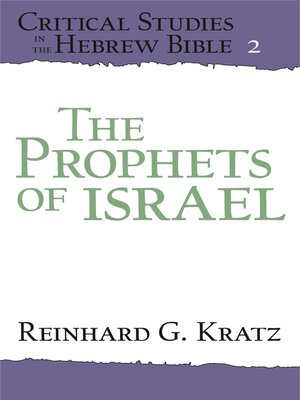
Sign up to save your library
With an OverDrive account, you can save your favorite libraries for at-a-glance information about availability. Find out more about OverDrive accounts.
Find this title in Libby, the library reading app by OverDrive.



Search for a digital library with this title
Title found at these libraries:
| Library Name | Distance |
|---|---|
| Loading... |
The book offers an up-to-date and readable introduction to the manifold literary and historical problems of biblical prophecy. Reinhard Gregor Kratz provides the reader with a clear analysis of the development of the institution of prophecy in ancient Israel and Second Temple Judaism. Through a close reading of the prophetic corpus he demonstrates that in biblical tradition we have to distinguish between the historical and the literary prophet. The historical prophet is a representative of ancient Israelite religion while the literary prophet – as presented in the biblical books—is part of the tradition of emerging Judaism. This development from historical representative to literary figure guides the analysis and it becomes clear that the special character of biblical prophecy as encountered in the books of the Bible is the result of a long process of tradition during which older material is reworked, restructured, and applied to new situations. The book takes the distinction between the historical and the literary phenomenon of prophecy seriously and, therefore, will focus primarily on the literary tradition. This tradition will be recognized as such and should not be confused with the historical prophet and his words. After an overview of various models of interpretation of biblical prophecy, Kratz will consider first the broader historical background and the phenomenology of prophecy in the ancient Near East and ancient Israel. Then he moves on to the literary evidence of prophecy in biblical tradition and its historical context, including the earliest commentaries on prophetic books, the Pesharim from Qumran. The study concludes with an appendix that will introduce the reader to the scholarship on the prophets and provide some suggestions for further reading.







